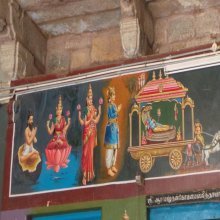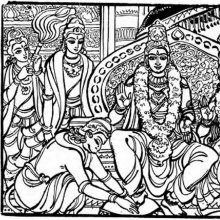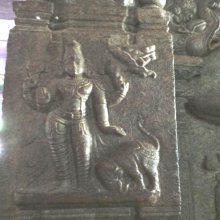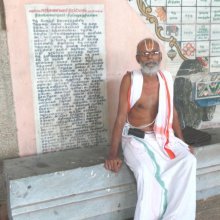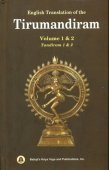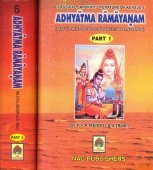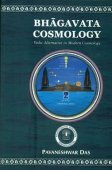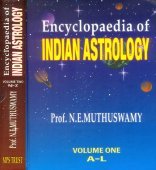Greatness: 1 definition
Introduction:
Greatness means something in Hinduism, Sanskrit. If you want to know the exact meaning, history, etymology or English translation of this term then check out the descriptions on this page. Add your comment or reference to a book if you want to contribute to this summary article.
Images (photo gallery)
(+1 more images available)
In Hinduism
Vedanta (school of philosophy)
Source: ORA: Amanaska (king of all yogas): (Advaita Vedanta)Greatness is denoted by the Sanskrit term Mahiman, according to Mādhavavidyāraṇya’s Śaṅkaradigvijaya 5.97.—Accordingly, “I [Śaṅkara] desire to know the basis of Brahman from the great sage Gauḍapāda, [who was] the student of the son of Vyāsa. Because of my devotion to [this] one aim, I have found you [my guru, Govinda,] who is full of all good qualities, who has obtained the supreme truth and whose greatness (mahiman) extends [throughout the land]”.

Vedanta (वेदान्त, vedānta) refers to a school of orthodox Hindu philosophy (astika), drawing its subject-matter from the Upanishads. There are a number of sub-schools of Vedanta, however all of them expound on the basic teaching of the ultimate reality (brahman) and liberation (moksha) of the individual soul (atman).
See also (Relevant definitions)
Full-text (+676): Mahiman, Mahatmya, Mahattva, Mahatta, Sthanamahatmya, Prathiman, Mahima, Mahan, Mahas, Thori, Thoravi, Ajamata, Matabari, Gataishvarya, Ularatta, Parthava, Mahitvana, Mahamahiman, Bhuti, Vaibhava.
Relevant text
Search found 257 books and stories containing Greatness; (plurals include: Greatnesses). You can also click to the full overview containing English textual excerpts. Below are direct links for the most relevant articles:
The Skanda Purana (by G. V. Tagare)
Chapter 42 - To donate bull and listen to the greatness of Dvārakā < [Section 4 - Dvārakā-māhātmya]
Chapter 100 - Index to Kāśīkhanda < [Section 2 - Uttarārdha]
Chapter 117 - Greatness of Bhūtanātheśvara (Bhūtanātha-īśvara) < [Section 1 - Prabhāsa-kṣetra-māhātmya]
Satapatha-brahmana (by Julius Eggeling)
Kāṇḍa XIII, adhyāya 2, brāhmaṇa 11 < [Thirteenth Kāṇḍa]
Kāṇḍa XIII, adhyāya 5, brāhmaṇa 3 < [Thirteenth Kāṇḍa]
Kāṇḍa II, adhyāya 2, brāhmaṇa 4 < [Second Kāṇḍa]
Flower Adornment Sutra Preface
The Padma Purana (by N.A. Deshpande)
Chapter 1 - The Contents of the Section in Brief < [Section 6 - Uttara-Khaṇḍa (Concluding Section)]
Chapter 222 - Kāśī, Gokarṇa, Śivakāñcī, Tīrthasaptaka and Bhīmakuṇḍa < [Section 6 - Uttara-Khaṇḍa (Concluding Section)]
Chapter 117 - The Importance of Bathing in Kārtika < [Section 6 - Uttara-Khaṇḍa (Concluding Section)]
Brahma Sutras (Nimbarka commentary) (by Roma Bose)
Brahma-Sūtra 1.3.9 < [Adhikaraṇa 2 - Sūtras 8-9]
Brahma-Sūtra 1.3.16 < [Adhikaraṇa 5 - Sūtras 14-23]
Brahma-Sūtra 3.2.20 (correct conclusion, 20-21) < [Adhikaraṇa 5 - Sūtras 11-21]
Chandogya Upanishad (Shankara Bhashya) (by Ganganatha Jha)
Section 7.6 (sixth khaṇḍa) (two texts) < [Chapter 7 - Seventh Adhyāya]
Section 2.20 (twentieth khaṇḍa) (two texts) < [Chapter 2 - Second Adhyāya]
Section 3.12 (twelfth khaṇḍa) (nine texts) < [Chapter 3 - Third Adhyāya]
Related products
